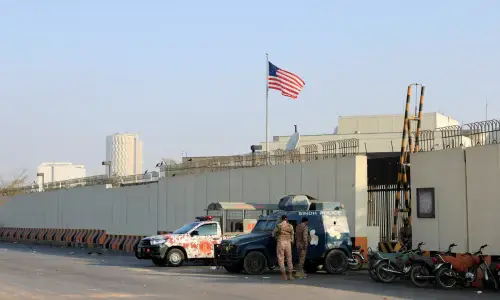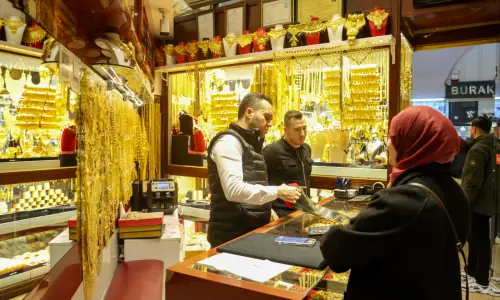Conflicting views and feelings become the order of the day whenever former military dictator, Gen Musharraf is put in the dock for his regime’s action against militants holed up in Islamabad’s Lal Masjid (Red Mosque).
Though the action took place more than five years ago, it still creates (at least in the mainstream and social media) heated debates and extreme stances.
One Abdul Rashid Ghazi had become the centrepiece of the event; a radical cleric who was said to have been leading a group of armed militants from the mosque and its seminary.
Ghazi today is remembered as a militant who had asked his followers to burn down CD shops and kidnap ‘obscene women’ in Islamabad because he wanted to force the government to impose Sharia Law across Pakistan.
After refusing to give in to the orders of the government of Gen Musharraf, the mosque and its seminary were stormed by the army and Ghazi was shot dead.
If one monitors what has been said about Ghazi in the media, two distinct views come to the surface: The first one describes him as a terrorist who wanted to impose his version of the Sharia by force, while the other hails him as a ‘mujahid’’ who stood up to the might of an ‘infidel state.’
But often we picture our heroes and villains as caricatures drawn from conflicting perceptions that are wildly aired in the media. I’ve always wondered why isn’t there any serious attempt to study them as we would any of our immediate contemporaries.
Last year, while on a visit to Islamabad, a journalist colleague of mine introduced me to an old college friend of Abdul Rashid Ghazi. Without any hesitation I got down to probe him about the less talked about (or even unknown) aspects of Ghazi’s life.
Who was he and what made him so desperately angry? I’m sure he wasn’t born this way.
Ghazi’s friend told me that he (Ghazi) was a militant for a very brief period of his life. Otherwise he was an extremely bright man with normal career ambitions.
“He could have been a diplomat in the foreign office or an educationist,” his friend told me.
The friend added that Ghazi’s greatest ambition was to become a diplomat at the United Nations. This is what Ghazi was planning to become when he joined college in 1982.
Ghazi was born into in a religious family. His father was a cleric who had founded the Red Mosque in the late 1960s.
He enrolled his two sons into an Islamic seminary. But Ghazi rebelled and dropped out, demanding that he be put in a ‘normal school’. This was in 1976 when he was about to enter his teens.
His father reluctantly got him admitted into an all-boys school from where Ghazi did his matriculation in 1979.
Ghazi’s friend fondly remembers him as an enthusiastic fan of music, films and political history. Ghazi had already begun dreaming of becoming a diplomat.
Nevertheless, Ghazi once again got into an altercation with his father. According to his friend, his father wanted him to grow a beard and join the seminary that he was running.
Not only did Ghazi refuse to grow a beard and join his father’s seminary, he went on to join a co-ed college. Here he got involved with various student groups opposed to the reactionary dictatorship of Gen Zia.
All communication between his father and him had broken down. They were not on talking terms when in 1984 Ghazi joined the Quaid-i-Azam University that was then a hotbed of anti-Zia activities.
He enrolled as an MSc student of International Relations. His friends remember him to be a bright student and an active member of a progressive student organisation.
This created a problem for his father, who was being facilitated by the Zia dictatorship to help produce jihadis for the anti-Soviet Afghan insurgency that Pakistan was backing.
“He hardly ever went to a mosque, let alone visited his father’s mosque,” his friend claimed. “He was reading writings by Marx, Max Weber and Henry Kissinger. He was a lively fellow but always focused on becoming an international figure in world diplomacy,” the friend added.
But Ghazi’s brother, who had followed his father into becoming a cleric, would never miss the opportunity to admonish Ghazi for going against family traditions and bringing a bad name to their father due to his ‘westernised’ ideas and lifestyle.
So what happened?
According to Ghazi’s friend, after getting his Master’s degree in International Relations, he ended up getting a job at the Ministry of Education.
The friend suggested that Ghazi was not happy with his job and was impatient to realise his dream of becoming a diplomat.
Estranged from his family and not achieving his goal quickly enough, Ghazi became agitated. Then in 1998 his father died. He was assassinated (allegedly) on the orders of an opposing militant outfit.
“All that guilt that had been instilled into him by his brother came to the forefront,” his friend explained. “His brother told him how he had hurt his father’s feelings …”
Ghazi went into depression and began attending the gatherings of a variety of Islamic evangelical groups.
Then, in 1999, he joined his brother at the Red Mosque where both became leaders.
After Pakistan entered the ‘War on Terror’ as a US ally, the brothers are said to have established links with militant Islamist organisations.
Ghazi was now a changed man. He’d grown a beard, renounced his ‘secular’ past and had become a vehement militant insisting that the state of Pakistan impose strict Sharia laws.
But, as his friend interestingly noted: “He wasn’t built to fight. He was too intelligent to become a jihadi. His philosophy might have become aggressive, but I don’t think he was willing to die for it.”
This statement makes sense. During the military operation against the Red Mosque militants, some TV channels began to report that Ghazi was willing to surrender, but was held hostage (through ‘emotional blackmail’) by some frontline militants in his entourage until the military finally barged in and shot dead each one of them.
Ironically, this man who had dreamt and studied to be an international diplomat died for an idea and cause he had actually rejected most of his life.

































